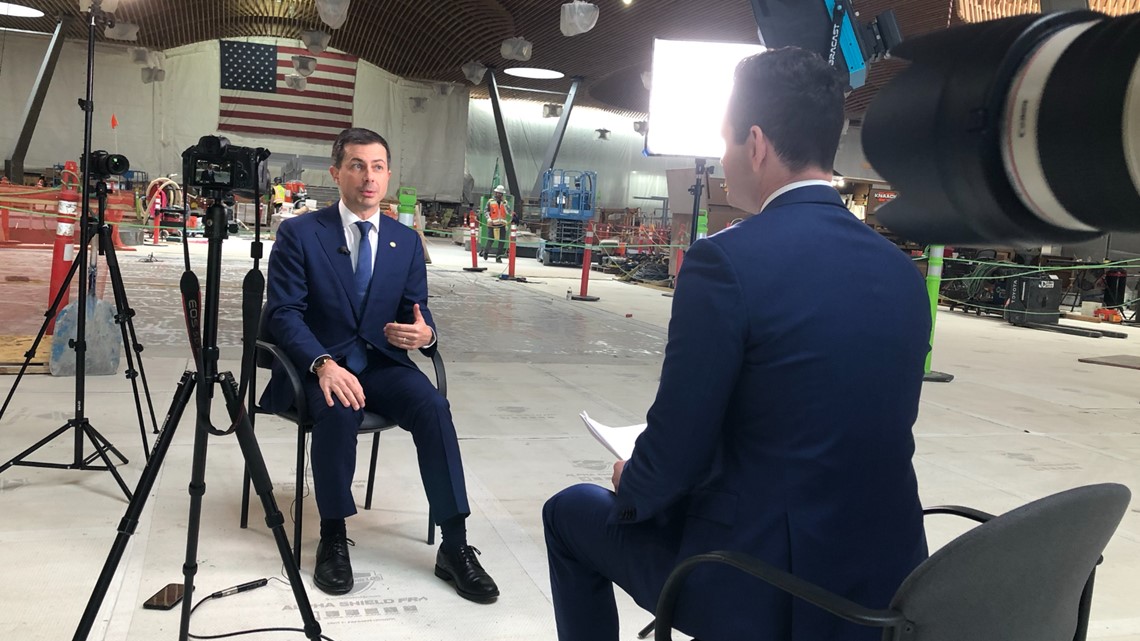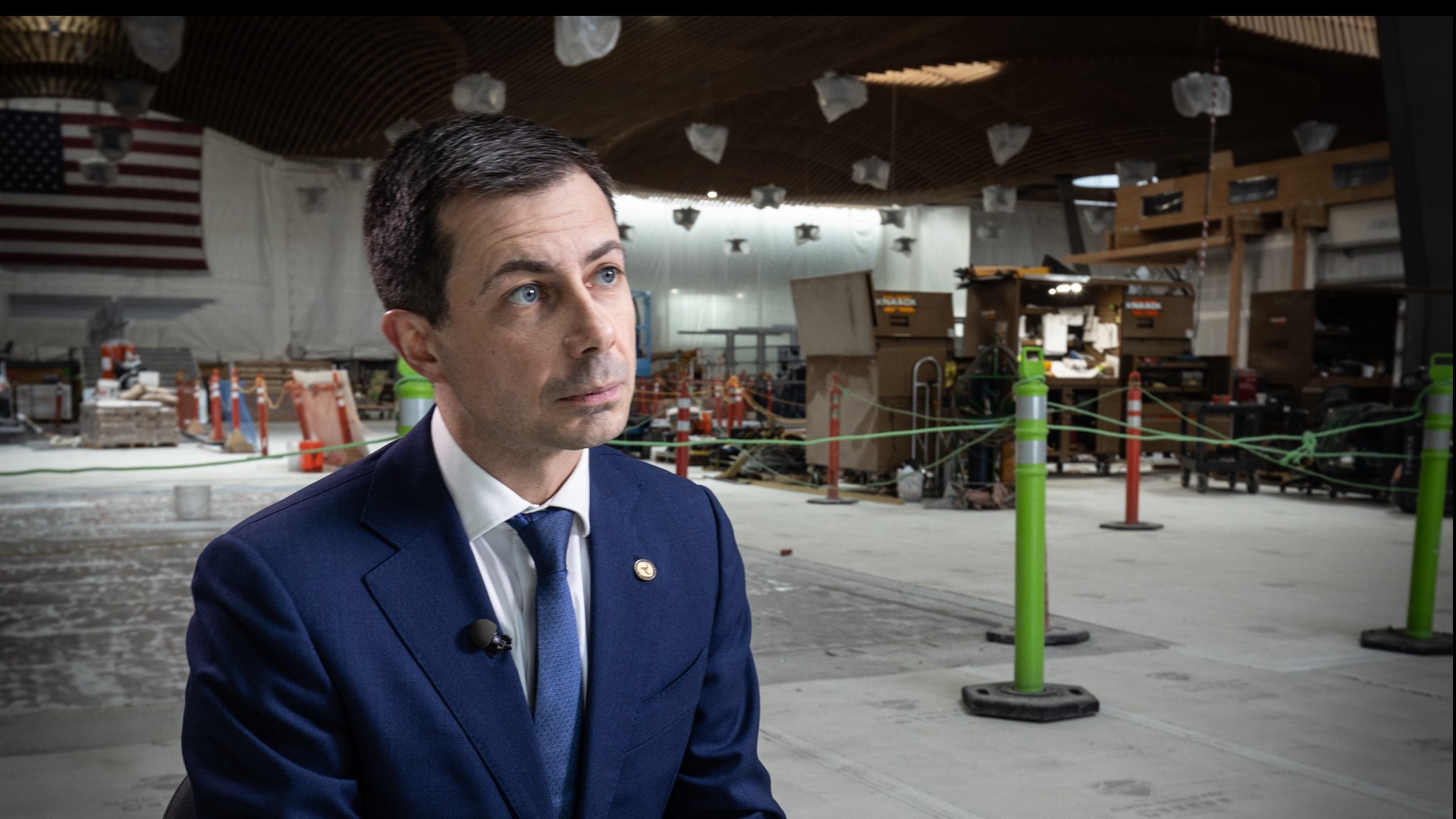PORTLAND, Ore. — U.S. Secretary of Transportation Pete Buttigieg landed in Portland on Monday for a visit that will include a look at construction of the new main terminal at Portland International Airport and checking in with the Interstate Bridge Replacement project.
He also sat down with KGW to talk about aviation safety in the wake of the Jan. 5 incident in which a Boeing 737 MAX 9 jet was forced to make an emergency return to the airport when a plug panel blew off the plane shortly after it took off from Portland.
Buttigieg called the incident "shocking" and said it has prompted an audit that will take a "wholesale look at how quality control on Boeing's lines is being looked at" as well as the way the Federal Aviation Admiration oversees the process.
"We never take for granted the fact that flying is the safest way to travel in the United States," he said. "And that means when there's an event like this, an incident like this, passengers go through what they went through on board — that requires really a national-level response."


A preliminary National Transportation Safety Board report released last week said the plug was missing four key anchor bolts that had likely been removed during the plane's final assembly at Boeing's factory in September and then not reinstalled. Buttigieg said the report highlights the direction the NTSB and FAA investigations will need to take.
Alaska Airlines and United Airlines both reported finding loose bolts on door plugs on other 737 MAX 9 planes once it began inspecting its fleet, which Buttigieg said points to a "bigger systemic set of questions around Boeing and around their supplier."
"Boeing is of course under a microscope right now," he said. "FAA is looking at every step of their process to understand how their — not just their quality control, but really their safety culture works, and what needs to change," he said.
Renewed look at federal aviation oversight
The investigation goes beyond Boeing, Buttigieg added, looking into the way authority and oversight is delegated to airplane manufacturers. Boeing employees currently act as inspectors on behalf of the FAA, signing off on various parts of the manufacturing process — a practice that has drawn increased scrutiny in recent years.
Buttigieg described current U.S. aviation regulations as a middle road between a close scrutiny system such as meat and poultry production — where federal regulators directly inspect factories— and a system more like automobile production, where regulators will instead compel companies to issue recalls to fix problems.
"There is a very good reason why everybody from our own department to some voices in Congress are asking about how to move that to where less of that responsibility sits in the manufacturer's hands," he said. "But in order for us to do that, we would need to add thousands of personnel and be budgeted accordingly. We can't do it without Congress."
When asked if the changes could include compelling Boeing to bring more of its manufacturing process back in-house, Buttigieg said he expects there will always be a mix of vendors and subcontractors involved, so the focus should be on making sure everybody in the chain is following the same safety standards.
Regardless, he added, Boeing is responsible for meeting the FAA's safety standards. He said he has spoken to Boeing CEO Dave Calhoun directly and stressed the need for Boeing to demonstrate beyond doubt that it can design and deliver safe aircraft.
"He has said all of the right things, but it's not about what you say. It's about the results, and the results are what are being audited right now by the FAA," Buttigieg said.
One thing hampering investigators looking into the Jan. 5 incident: The plane's Cockpit Voice Recorder (CVR) captured audio of the depressurization incident, but the the recording was automatically overwritten after the plane landed because nobody paused it within two hours.
When asked about the possibility of retrofitting the CVR modules on existing planes to increase their memory capacity, Buttigieg said the FAA was already considering that change before the Jan. 5 incident.
"FAA is going to have more of the analysis of which of the aircraft can be done first, but I think the bottom line is there's a compelling case for there to be access to more recording than there is right now," he said.
Air traveler consumer protection
The Biden Administration has recently announced efforts to increase consumer protection in the air travel industry, such as a push to make it easier for parents to be seated near their children and a push to get refunds back to customers following a series of airline operational meltdowns.
Asked what letter grade he would give US airlines on the issue, Buttigieg said "incomplete," but added that the companies have taken some initial steps, and he pointed to the administration's flight rights dashboard where consumers can learn more about their options.
"I just don't think we can count on the airlines to improve on their own," he said. "That's why we're also pushing forward with regulations and enforcement to make sure that they have to provide a better experience, make sure that they have to do a better job of getting people's money back to them when it is owed them."

